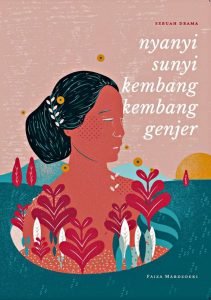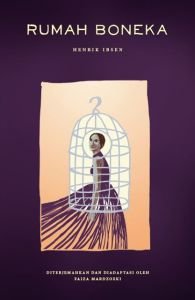BOOKS
Waktu Tanpa Buku (Time Without Books)

WAKTU TANPA BUKU is a drama written by Lene Therese Teigen, a Norwegian playwright. It tells a story about the memories of the victims of the past dictatorship in Uruguay. Lene wrote the manuscript based on research and interviews with exiles from Uruguay in Europe.The manuscript was translated into Indonesian by Faiza Mardzoeki.
She thinks that the drama is very universal and very close to us here in Indonesia. The WTB drama unravels the personal memory of individuals that stem from the experience of the great turmoil of their nation’s politics.
The characters created are very strong and can be a representation of anyone who may have experienced something similar. This drama is also able to speak to those who have only heard whispers of what has happened, as well as to readers of the younger generation who are completely alienated from the history of their country.
An Anthology of New Indonesian Plays

A unique anthology of hard-hitting contemporary plays exploring a wide range of themes and characters, from religious teens to sex workers to survivors of political turbulence, providing insight into the changing nature of Indonesian society today.
THE SILENT SONG OF THE GENJER FLOWERS by Faiza Mardzoeki translated by Gratiagusti Chananya Rompas & Mikael Johani. Four women friends gather to help Nini reveal a painful secret to her granddaughter about their ordeal in a prison camp, and its consequences.
Red Janger by Ibed Surgana Yuga translated by Andy Fuller. A village tries to lay lingering ghosts to rest through the spiritual purification of a mass grave, but one family faces surprising truths.
CUT OUT by Riyadhus Shalihin translated by Alfian Sa’at.
A vibrant mash-up of Indonesian history from the village to the top.
SIN by Trisa Triandisa translated by John H. McGlynn from the novel Not a Virgin by Nuril Basri. A group of young men at a religious school explore their sexual identities at a gay nightclub and as sex-workers.
BREAK IN by Agnes Christina A young woman locks herself in her bedroom, talking to the many voices around her. Can she find answers and connections?
BEDFELLOWS by Hanna Fransisca translated by Cobina Gillitt. Centring on a local coffee shop, the play explores rising ethnic conflict and the protest by local people against a Chinese dragon statue.
THE MAKASSAR TRILOGY by Shinta Febriany translated by Alfian Sa’at. Three short plays exploring the break-up of a community and the harmful effects of beach redevelopment on its people.
Foreword by Muhammad Abe & Gunawan Maryanto
Introduced by Rebecca Kezia
Edited by Cheryl Robson
Nyanyi Sunyi Kembang-Kembang Genjer (The Silent Songs of The Genjer Flowers)

This play highlights the perspectives of women activists of Gerwani (Indonesian Women’s Movement) who were political prisoners, suffered sexual violence, and were stigmatized for decades as immoral women in Indonesia between 1965-68 and onwards. During that time hundreds of thousands of members of the Communist Party of Indonesia (PKI) or those considered close to the PKI were murdered and tens of thousands also also imprisoned. Out of this upheaval came the military backed New Order regime, under General Suharto.
In this period, the slander about the savagery of Gerwani women was spread by the military regime to justify these massacres. This propaganda claimed, falsely, that communist women had danced naked in front of detained generals, slit their genitals and otherwise tortured them before they were shot dead. Official autopsies, secret for decades, showed there was no torture
Scholars have argued that the New Order regime legitimized itself through the demonization of female sexuality used to evoke fear of communism in society.
The myth of Gerwani as a monster was not only a justification for the mass slaughter and dictatorship but also the removal of women from the political realm. During the New Order era, women’s role in public areas was allowed as long as it was within the structures defined by the state, which positioned women as obedient to and dependent on men. Gerwani was an organization that fought for women’s rights in all areas. The regime’s black slander has erased Gerwani’s real role from our memory.
The play offers a counter-discourse through the experience of the five former political prisoners.
Eyang Nini tells of memories of when women were involved in social work and active in cultural life. Through these stories, young Ming is invited to explore the past. The narrative that emerges through the dialogue and monologue of the grandparents is a bitter story of women who are imprisoned, raped, and separated from their families. In addition to hearing of the state violence, we see how these women survived after prison in a society that continues to reject them. Through a series of questions asked by the Ming the past is slowly revealed. From this is also revealed the inner turmoil and the trauma of these women. And of Ming too: her generation has its own inner turmoil to reflect upon.
The playwright interviewed 30 former women prisoners, and their families, and observed their current activities. Archives and secondary sources were also used.
Rumah Boneka
Faiza has been translating and adapting the realist drama script by Norwegian playwright Henrik Ibsen, entitled “A Doll’s House”, into Indonesian, “Rumah Boneka”. A Doll House is considered by some to be the world’s first feminist drama. By Faiza, Ibsen’s script was adapted into the Indonesian context with the background of contemporary Jakarta events.
The story of the Doll House drama is very relevant to Indonesian society. This adaptation script addresses events that occur in Jakarta’s middle class families, at the present time. About a husband and wife who have to re-question the values of life and their family environment. The Doll House also invites us to look back at its morals, religion and society, which are filled with mental corruption and hypocrisy.
Subversif!

An adaptation from Henrik Ibsen’s classic An Enemy of The People.
“Mayoritas selalu benar adalah tirani kebenaran! Mayoritas selalu benar adalah kebohongan sosial! Setiap manusia merdeka dan berakal sehat harus memberontak terhadapnya.”
Subversif! Sebuah drama adaptasi dari ‘An Enemy of The People’ oleh Faiza Mardzoeki, merupakan drama realis Lima Babak, mengangkat tema yang sangat relevan dengan pertanyaan hari ini yaitu tentang moral kebenaran dari suara mayoritas. Apakah suara mayoritas selalu benar? Apakah suara mayoritas selalu memberi jalan terbaik untuk masyarakatnya?
Drama Subversif! menantang kita semua untuk memikirkannya. Subversif! memberi pengertian bahwa kebenaran tidak boleh disembunyikan meskipun akan melawan arus mayoritas. Kebenaran harus ditegakkan meskipun kadang kesepian dan tersudut, bahkan bisa dianggap gila dan memusuhi kekuasaan.
Pertanyaan moral kebenaran itu bisa dijumpai terutama melalui tokoh protagonis Dokter Torangga dan tokoh antagonis Walikota Jokarna. Di sini, para agen di masyarakat bermain. Ada pemilik media. Ada politisi. Ada Penguasa. Ada Pengusaha. Ada Ibu Rumah Tangga. Ada Wartawan. Ada intelektual. Lalu, ada massa yang diberi mahkota sangat indah yang bernama Rakyat!



